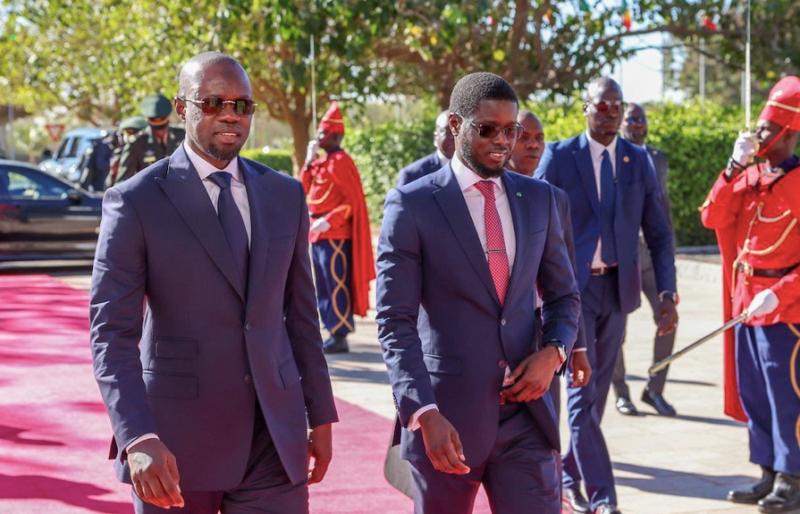Gambiaj.com – (DAKAR, Senegal) – Less than a year after President Bassirou Diomaye Faye assumed office with the backing of his influential ally, Prime Minister Ousmane Sonko, Senegal finds itself in the midst of an escalating power struggle at the highest levels of government, according to the pan-African online magazine Afrique Confidentielle.
What was initially celebrated as a democratic renewal has quickly devolved into a fierce contest for control, particularly over the country’s security apparatus, fueling tensions and deepening divisions within the administration, the magazine revealed.
Sonko, who was appointed Prime Minister in April 2024, has reportedly moved swiftly to consolidate control over Senegal’s intelligence and law enforcement institutions.
Leveraging his political clout and the unwavering support of his PASTEF party, he has allegedly placed loyalists in key security agencies, including the General Delegation for National Intelligence (DRN), the Directorate of Territorial Surveillance (DST), and the General Directorate of Foreign Intelligence (DGRE). The objective, according to insiders, is to ensure that intelligence flows first to the Prime Minister’s office, effectively sidelining the President in matters of national security.
Observers now warn that Senegal’s government is operating under a “state within a state,” with Sonko allegedly running a parallel intelligence network that even extends to monitoring President Faye’s private life. Reports suggest that senior security officials, including some within the military and police, bypass traditional chains of command to report directly to Sonko.
Alarmingly, the Prime Minister’s reach is said to extend to surveillance of the President’s close associates, family members, and even his two wives, Marie Khone Faye and Absa Faye—an unprecedented move in Senegalese politics.
The fallout from this power grab has manifested in growing resistance from elements within the security services. Two of the most senior security figures—the High Commander of the National Gendarmerie and the Director General of the National Police—are reportedly at odds with Sonko, whom they accuse of attempting to override presidential authority. In response, Sonko has allegedly pushed for the removal of high-ranking officers he deems too loyal to President Faye, replacing them with individuals seen as politically reliable.
This growing rift has led to dysfunction at the heart of Senegal’s security institutions. Reports suggest that the Director of Police has refused to share sensitive intelligence with Sonko’s office, insisting on briefing the President first. Military and intelligence officials have also expressed concern about the politicization of security services, with some top generals privately cautioning against Sonko’s methods.
General El Hadji Daouda Niang, who heads the DRN, is reportedly caught between his duty to the President and pressure from the Prime Minister, leading to jurisdictional disputes and an increasingly paralyzed security apparatus.
The political standoff has drawn comparisons to historical power struggles where dominant figures within a government ultimately overshadow or even depose the sitting head of state.
Some analysts liken the current scenario to Rwanda’s 1990s leadership crisis, where Vice President Paul Kagame gradually consolidated power, eventually forcing President Pasteur Bizimungu out of office. Others cite the United States’ Watergate scandal, highlighting the dangers of secretive surveillance and unchecked executive control over intelligence.
For now, Senegal’s fragile political stability hangs in the balance. With Sonko continuing to expand his influence and the presidency increasingly isolated, the potential for an outright institutional crisis looms large.
Some senior officials have quietly floated the idea of mediation by respected former generals to defuse the standoff. However, if left unchecked, the ongoing power struggle could threaten the very democratic principles that Faye and Sonko once pledged to uphold.
As Senegal watches these developments unfold, the question remains: Will President Faye reassert his authority, or is the Prime Minister positioning himself as the country’s true power broker? One thing is certain—the political honeymoon is over, and the battle for control is just beginning.










